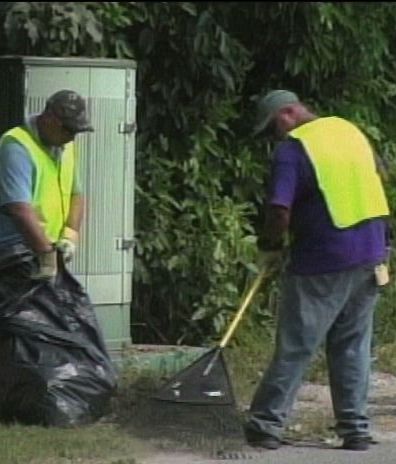Archive for December 20th, 2011

Cops report Christmas crashes on the increase
 (CNS): Despite the hopes that its seasonal road and public safety campaign would have raised awareness on the islands’ roads the RCIPS said Tuesday that three times as many minor road crashes had taken place over the past few days than normal, prompting police to issue a reminder to drivers to take more care on the roads. “Normally we see around three minor road crashes a day, but over the past few days we’ve sometimes seen as many as ten,” said Chief Inspector Robert Scotland. “Drivers are just not paying attention to the road or weather conditions.” (Photo Dennie Warren Jr)
(CNS): Despite the hopes that its seasonal road and public safety campaign would have raised awareness on the islands’ roads the RCIPS said Tuesday that three times as many minor road crashes had taken place over the past few days than normal, prompting police to issue a reminder to drivers to take more care on the roads. “Normally we see around three minor road crashes a day, but over the past few days we’ve sometimes seen as many as ten,” said Chief Inspector Robert Scotland. “Drivers are just not paying attention to the road or weather conditions.” (Photo Dennie Warren Jr)
The senior officer highlighted some of the offences his officers are recording as well as the causes of these various crashes which have not caused any serious injuries.
“We’re still seeing people ignore the speed limits, tailgate and, despite the fact that using cell phones whilst driving will soon be illegal, people are not changing their driving habits and believe that they can safely multi-task when driving,” CI Scotland said. “It’s only when they get involved in a crash that they realise how much damage that lack of focus and concentration can cause. Fortunately the majority of the crashes have been non-injury, but the next driver who doesn’t concentrate on what he or she is doing may not be so lucky.”
Road sale won’t need LA OK
(CNS): As a result of changes made to the Governor’s Vesting of Lands Law, which relates to the management of crown or publicly owned lands, the government will be able to swap a stretch of the West Bay Road with Dart as planned without undertaking any of the requirements in the law regarding valuations, advertising of the intended swap or the tabling of a report in the Legislative Assembly. Although section 10 of the law sets out a number of procedures the government is supposed to follow when disposing of crown land, all of them can be ignored as a result of a subsection in the law which was inserted by the previous UDP administration.
The March 2005 amendment says the "Governor in Cabinet my waive any of the requirements” in the law that would have forced government to bring a proper evaluation and a full report to the Legislative Assembly for public consultation before any transfer took place.
The changes were brought by the then planning minister, Juliana O’Connor Connolly, who said in the Legislative Assembly, “The rationale is that the disposition of Crown Land, either in the public’s interest or to statutory authorities or government companies, should not be required to comply with the long and often protracted process of the tabling of reports in the Legislative Assembly.”
The amendment led to the waiver being inserted and allowed government to avoid following the previous processes and procedures if it decided a sale of transfer of crown land was in the public interest. “The waiver would authorise in cases where the Governor in Cabinet proposes to sell, convey, grant, or devise lands, firstly to statutory authorities or government companies or to any legal entity where it is in the public’s interest,” the minister said at the time.
However, government may still opt to go through the process of getting the land it intends to swap with Dart valued since the developer’s CEO said publicly at the groundbreaking of the Esterley Tibbetts Highway extension in September that Dart was keen to follow the proper requirements.
Jackie Doak told the audience that the group wanted to see the proper processes applied throughout the ForCayman Alliance with government, such as coastal work licences and vested lands for all of the projects, even if it took longer than people would like. “It is important to Dart that the appropriate process is followed,” she said.
The independent member for North Side, Ezzard Miller, said that if government has nothing to hide then there is no reason for it not to go through an open and transparent process with the land deal and bring a report to the parliament as set out in the law. He said he had concerns that if Cabinet waived the requirements to get a government and an independent valuation on the land, the people may never know the proper worth of their land to assess if the exchange is fair.
Miller added that it was important for everyone to consider what the value of the land would become once it is absorbed into a beachfront property and what that will do to the value of the land that Dart already owns. He said that he was disappointed that the NRA element of the deal had already been signed without the rest of the deal being completedor the proposal coming before the Legislative Assembly. “The people should be allowed to know how much this deal is worth and if the swap is fair,” he said. “If the deal was so good then why would government not have been more transparent?”
Miller noted that according to local real estate experts, the transfer of the 2,300 feet of West Bay Road to Dart could triple the value of his land there.
The developer has stated that with the signing of this primary element of the deal it will get Caymanians back to work as it begins the highway extension to West Bay.
The NRA Agreement calls for the closure of a section of West Bay Road under the Roads Law, and combining the discontinued road lands with Dart property to facilitate the redevelopment of a new four- to five-star hotel on the former Courtyard Marriott site to start within 12 months, as well as the completion of the Esterley Tibbetts Highway from its current ending point to Batabano Road.
Dart said it will also construct an extension of Reverend Blackman Road to connect Willie Farrington Drive to the Esterley Tibbetts Highway. In addition it will construct a new road to Barkers National Park and hand over to government US$5M of the ForCayman Investment Alliance’s negotiated total of US$20.5M. The construction value of the road infrastructure projects is around US$35 million.

Ozzie acquitted in cow cod assault case
 (CNS): After more than 14 months of waiting for the outcome of the charges laid against him, former MLA Osbourne Bodden expressed enormous relief on Tuesday morning as he was acquitted of beating a man with a cow cod. The Bodden Town business man had always denied using a five foot long bull’s penis, as claimed by Kirk Watler. He had, however, admitted hitting him with a stick in self defence during an altercation at Lorna’s Texaco, the gas station owned by Bodden, in October 2010. Magistrate Nova Hall found Bodden not guilty of assualt as she said there were far too many inconsistencies in the evidence given by Watler.
(CNS): After more than 14 months of waiting for the outcome of the charges laid against him, former MLA Osbourne Bodden expressed enormous relief on Tuesday morning as he was acquitted of beating a man with a cow cod. The Bodden Town business man had always denied using a five foot long bull’s penis, as claimed by Kirk Watler. He had, however, admitted hitting him with a stick in self defence during an altercation at Lorna’s Texaco, the gas station owned by Bodden, in October 2010. Magistrate Nova Hall found Bodden not guilty of assualt as she said there were far too many inconsistencies in the evidence given by Watler.
Bodden said that although he was confident he would eventually be acquitted, the case had been a cloud hanging over him and his family. He said that the case should never have gone so far as it was just a case of self-defence.
Looking forward to the holidays and thanking God, he said, “This is such a relief for me and my family after such a stressful time. It’s a good Christmas present.”
During the trial the court heard how the fight between Bodden and Watler had occurred after Watler had caused a disturbance at the gas station’s liquor store.
On the day in question at around lunchtime, Bodden had given Watler a flask of rum and a packet of cigarettes for helping to unload a truck. Watler had shared the rum that afternoon with a group of friends who were also hanging around the public beach by the station, enjoying a drink or two. Sometime later on the same day after Bodden had left, Watler returned to the liquor store at Lorna’s with a flask of rum, which he insisted was a different bottle from that given to him by Bodden, asking to exchange the ‘rum’ for cash or beer.
The cashier told Watler she would need to contact Bodden to clear the exchange with him and he then became agitated, angry and upset and caused a scene in the store, insisting that she made the exchange without calling her boss, but when the police were called he left the premises.
Later that evening when Bodden returned, Watler was still on the beach drinking and witnesses said he was taunting Bodden about calling the police. A few minutes later a member of the staff who was working the pumps at the gas station saw both men engaged in a tussle across the street on the ground and he ran over to pull them apart. He did not see Bodden strike Watler but he saw that Bodden did have a stick and that Watler had two green beer bottles in his hands.
Watler claimed that during the altercation Bodden had struck him several times with a cow cod, described as being some 4 inches in diameter and around 4 to 5 feet long, but the witness did not see such a weapon.
During the trial the lawyers agreed that the credibility of the complainant, who had clearly been drinking on the day, was in question and the magistrate would have to consider if he was bolstering his case by manufacturing things.
Ferguson noted, however, that the injuries sustained by Watler were consistent with a weapon which was pliable rather than a stick. Lloyd Sampson, who was representing Bodden, asked the magistrate to consider the incredulous nature of the complainant’s evidence, whom he said had “lost the plot” in the shop on the day in question, which had been captured on the CCTV.

It must be Christmas
I noticed last night that there is the usual one lonely string of Christmas lights hanging forlornly from the utility poles in George Town. Is this the best we can do? What will our visitors think? What do our children think? Perhaps we need to look at what our competition is doing — we might learn a thing or two.
This initiative is so poor that it would be better not to put them up at all. If the organization behind these poor benighted lights cannot afford better then perhaps they could approach the merchant community and ask for a donation. Or they could ask the premier if he could spare a contribution from his, ah, 'delegated fund'.
We have claimed for years to be a tourist destination but it seems that we have no concept of how to do this. We cannot even get our act together to put pedestrian crossings on the West Bay Road to stop our visitors getting mown down by insane drivers. We have paid lip service for decades to the idea of, first of all, cruise ship moorings (remember the anchors from the Rapsody salvage?) and more lately a cruise ship pier, and we still don't have one.
If we are seriously catering to tourists then we need to make their experience as memorable as possible, and this is memorable in a positive way, not to have some of them return to their home country in a body cast!
Perhaps we should be trying to work on increasing our stayover tourism. A lengthened runway would allow us to bring in long haul flights from Asia or the Persian Gulf (many multi-millionaires). In fact, this might allow Cayman Airways to finally make a profit by becoming a regional hub for the Western Caribbean and Central America.
Have a wonderful, if rather drab, Holiday Season!

Rollover suspension comes as relief to tourism sector
 (CNS Business): Two months after the Legislative Assembly passed the two-year suspension of the term limit or “rollover” policy, reaction within members of the tourism industry is mixed, though employers expressed satisfaction that their staff on work permits facing their seven-year maximum can now stay longer. The Term Limit Extension Period enables employers to retain staff an additional two years, but questions about its efficacy and implementation remain. Steve Broadbelt, partner in dive operator Ocean Frontiers and a critic of the rollover policy, referred to the TLEP as a stopgap measure that will not ultimately deal with the issues surrounding the rollover policy and the eventual granting of permanent residency. Read more on CNS Business
(CNS Business): Two months after the Legislative Assembly passed the two-year suspension of the term limit or “rollover” policy, reaction within members of the tourism industry is mixed, though employers expressed satisfaction that their staff on work permits facing their seven-year maximum can now stay longer. The Term Limit Extension Period enables employers to retain staff an additional two years, but questions about its efficacy and implementation remain. Steve Broadbelt, partner in dive operator Ocean Frontiers and a critic of the rollover policy, referred to the TLEP as a stopgap measure that will not ultimately deal with the issues surrounding the rollover policy and the eventual granting of permanent residency. Read more on CNS Business

Stalker found guilty of rape
 (CNS): A man who systematically stalked, harassed, abused and sexually assaulted his former lover was found guilty of rape, assault and abduction by the chief justice Monday. Philip Rose was convictedof the crimes following a judge alone trial in which the court heard how he had emotionally and physically abused his victim over a two and half year period after she broke off their relationship. Rose had denied the offences, accusing his victim of being an abusive, jealous and controlling woman who had contrived the allegations against him after he had rejected her. However, as a result of telephone messages, texts and emails that his victim had kept over the period of abuse, along with other evidence, the judge took a different view.
(CNS): A man who systematically stalked, harassed, abused and sexually assaulted his former lover was found guilty of rape, assault and abduction by the chief justice Monday. Philip Rose was convictedof the crimes following a judge alone trial in which the court heard how he had emotionally and physically abused his victim over a two and half year period after she broke off their relationship. Rose had denied the offences, accusing his victim of being an abusive, jealous and controlling woman who had contrived the allegations against him after he had rejected her. However, as a result of telephone messages, texts and emails that his victim had kept over the period of abuse, along with other evidence, the judge took a different view.
Chief Justice Anthony Smellie presided over the trial of the George Town man in November when, over three days of evidence, the victim, a former executive of the Cayman Islands branch of a major bank, recounted a harrowing ordeal of abuse in which she became trapped through fear and embarrassment.
She described being stalked “every minute of the day”, with Rose being “always just 10 metres away” controlling her entire life through fear and intimidaiton. He followed her to and from work and whenever she went out; he repeatedly turned up and knocked on the window of her apartment; he constantly called and texted her cell phones and her office line, making abusive threats. He also physically assaulted her and raped her on some six occasions.
The victim had made some attempts to contact the police during her ordeal but had failed to follow through with the reports as a result of a number of what the judge described as complex issues and because of fear of her abuser.
She had, however, reported the rape and abuse to a local counsellor and had seen a doctor after two physically violent assaults that Rose had committed against her, long before she eventually transferred to Canada and filed her complaint against him.
As well as taking pictures of her injuries received at the hands of Rose, the victim had also saved a significant number of the phone messages, texts and emails that Rose had made and sent to her from when the abuse and stalking first started after she broke up with him to when she had moved to Toronto.
It was these messages that the judge said painted a very different scenario from the one claimed by the defendant that he was the victim of a jealous, scorned woman’s false allegations. The telephone messages were exceptionally abusive and aggressive, littered with expletives and profanities as well as frightening threats. The judge said the messages were threatening and violent and illustrative of the state of mind of the defendant.
In his verdict, in which he found Rose guilty of six counts of rape, two of assault causing actual bodily harm and one of abduction, the judge said that despite some behaviour on the part of the victim that may seem hard to understand, he was satisfied she was telling the truth about her ordeal and in particular the specific counts on the indictment.
He said the aggressive and abusive telephone messages revealed an “obsessive, controlling and arrogant man who refused to accept he had been rejected.” The nature of the messages made it clear that they were not empty threats, as claimed by the defendant, but evidence of the abuse.
The judge found that the victim had not contrived the allegations after the event, in part because he said the messages began at the point when the victim claimed she had ended the relationship.
The victim had admitted to having a consensual affair with Rose when she was going through a difficult period in her own marriage. She had met him in a West Bay Road bar in 2006, where she had given him her number, and soon after they developed a largely sexual relationship that lasted for around five months before she discovered that Rose, who was also married and claiming to be going through a divorce, had many other lovers.
She told the court that on the day the victim broke off the relationship he changed and become aggressive, abusive and threatening. He told her thatshe belonged to him and he would never let her go.
For more than two years he was true to that threat and it was not until he abducted her and kept her captive in her own home for more than two days abusing, assaulting and raping her whilst she suffered from a concussion that she finally confided in her boss at the bank and systematically began to plan her escape and formally reported the crimes to the police.
The judge noted that the victim’s trust in the police had been undermined at the very start as she said a complaint she filed was lost. Later, with what he described as "the lackadaisical" efforts by the Family Support Unit, the records of her complaints there were also lost. The victim was put off too by the dismissive manner in which she claimed she was treated when she had first approached the police to make a report.
The victim finally broke through her silence, which was caused by a combination of fear for her safety, fear over losing her career, of him interfering with her immigration status, public exposure and embarrassment, as well of a feeling that she had caused the problem. Fearing that he really would kill her the next time, she revealed her ordeal.
When she made her escape to Canada, the messages from Rose were even more aggressive and threatening, despite claiming that he was the one who had by that time broken off what he claimed to be a continuously consensual relationship. When he finally realised that she was following through with the report and revealing her ordeal to the authorities, Rose left the Cayman Island for Panama where he was arrested in February of this year.
During the trial the victim admitted going along with Rose on occasions when he demanded and letting him into her apartment, where she had given reluctant consent to sex as she said sometimes it was just easier to give in because of the relentless harassment and a way to gain some piece of mind.
“I was embarrassed and I was scared and I did not know where to turn,” the victim had revealed in her evidence, adding that she really believed Rose’s threats that he would kill her or her husband.
In his verdict, which took three hours to deliver, the judge noted that consent when given as a result of force fear and intimidation was not consent.
Prior to the trial Rose had pleaded guilty to one of the counts against him, which was for abusing the complainant via an IT network in connection with the texts, emails and phone messages he sent.

Shredding public documents a crime, says ICO
 (CNS): In the wake of a recent decision by the information commissioner ordering the port authority to release documents relating to the GLF negotiations, the information commissioner’s office (ICO) has noted that under the Freedom of Information Law it is a crime to alter or destroy a public record in an effort to stop its disclosure. Following a number of comments on CNS by people worried that public authorities could be inclined to destroy information when forced to disclose things of a sensitive nature, the deputy commissioner said that during an appeal or hearing the relevant records are made available to the ICO so there should not be any discrepancies in what is ultimately disclosed to an applicant.
(CNS): In the wake of a recent decision by the information commissioner ordering the port authority to release documents relating to the GLF negotiations, the information commissioner’s office (ICO) has noted that under the Freedom of Information Law it is a crime to alter or destroy a public record in an effort to stop its disclosure. Following a number of comments on CNS by people worried that public authorities could be inclined to destroy information when forced to disclose things of a sensitive nature, the deputy commissioner said that during an appeal or hearing the relevant records are made available to the ICO so there should not be any discrepancies in what is ultimately disclosed to an applicant.
“The one aspect of FOI that actually constitutes a criminal offence is where someone alters or defaces, blocks or erases, destroys or conceals a record with the intention of preventing its disclosure (section 55 of the FOI Law)," Jan Liebaers explained.
"As well, the unauthorized destruction of government records is also an offence under the National Archive and Public Records Law 2007 (section 11 of the NAPR Law). Under both of these provisions an offence is punishable by fine or imprisonment. So far, neither of these two provisions has been used.
“These offences should not be confused with the normal process under the FOI Law, where a public authority may withhold access to records based on a claim that certain lawful exemptions apply, andthe Commissioner may decide whether she agrees or not upon appeal,” he added.
The FOI requests that are making the news headlines are mostly those that have been refused and have involved the ICO and eventually resulted in a hearing. But information managers are disclosing information in half of all requests and increasingly making more and more information available as the implementation of the law slowly begins to influence the previous culture of secrecy in government.
According to the ICO’s latest statistics, 50 percent of cases result in full (37%) or partial (13%) disclosure.
“The vast majority of FOI requests are resolved without any action or input from the ICO,” Liebaers said. “An increasing amount of government information gets released on a routine basis, without use of the FOI Law. Whether this is sufficient can be debated, but the overall positive influence of FOI cannot be denied, and neither can the hard work of many FOI Information Managers in the various public authorities.”
Information Commissioner Jennifer Dilbert has now ruled on 19 different cases where she has in ordered full disclosure, partial disclosure or has found that the authority had applied the law incorrectly by not revealing the information requested.
When the commissioner makes a decision that a public authority must disclose information, Liebaers explained, it is not her office that releases the documents. “At no time does the ICO itself release responsive records,” he said. “Disclosure is always undertaken by the public authority whose records they are, whether before or after an appeal to the ICO. This is in order to avoid any confusion, and to protect the ICO.”
When an authority is ordered to release a document by Dilbert it has, under the law, 45 days to reveal the documents in question. This is to ensure that either party has sufficient time to file an appeal with the Grand Court by means of a judicial review on the commissioner’s decision if they believe she is wrong but there is nothing to keep a public authority from releasing records before this period is up, which Liebaers says has been the case in most of the appeals so far.
As yet, no decision of the commissioner has made it to the courtroom. Although the Department of Agriculture went as far as filing an appeal with the courts over the commissioner’s order that they release the Alliance of Marine Mammal Parks and Aquarium Standards and Guidelines, which had been used to create the country’s own standards for managing captive dolphins, the authority withdrew the application to the courts and eventually released the document to the applicant.
The ICO discovered Monday that there is a problem with the email address for appeals (appeals@ico.gov.ky) which is being fixed, but in the meantime the office can be reached at info@infocomm.ky
Visit the IFO website for more information and to see all of the commissioner’s decisions and reports www.infocomm.ky.

Loss of license could cause long term struggles
 (CNS): Dozens of drink drivers have now been arrested since the start of Operation Christmas Cracker, police reported Monday. Twenty-eight people who have been caught since the police seasonal campaign began now face the loss of their driving licences, hefty fines and other serious implications because they were caught drinking and driving. The RCIPS is currently embarked on an aggressive campaign to change attitudes towards drinking and driving. Encouraging people to think about the long term impact of the crime, Inspector Adrian Barnett warned drivers that losing their licence may only be the start of significant economic loss. (Photo Dennie Warren Jr)
(CNS): Dozens of drink drivers have now been arrested since the start of Operation Christmas Cracker, police reported Monday. Twenty-eight people who have been caught since the police seasonal campaign began now face the loss of their driving licences, hefty fines and other serious implications because they were caught drinking and driving. The RCIPS is currently embarked on an aggressive campaign to change attitudes towards drinking and driving. Encouraging people to think about the long term impact of the crime, Inspector Adrian Barnett warned drivers that losing their licence may only be the start of significant economic loss. (Photo Dennie Warren Jr)
“A conviction for drink driving could cost you much more than losing your licence or a fine,” he said. “If you have to drive as part of your job, you may end up losing that job, being unable to pay bills and ultimately you may not be able to pay your mortgage to keep a roof over the head of your family. So, if the thought of injuring or killing yourself or someone else is not enough to stop you from getting behind the wheel, think of the long term financial impact your actions could have on your loved ones.
“The RCIPS will continue to aggressively target drink drivers over the coming weeks. Road blocks and random stop checks will be commonplace. So, don’t gamble with your life or your financial security. If you plan to drink, designate a driver or take a taxi,” he added.
Police revealed that one of the drink drivers arrested at the weekend was trapped inside his blazing car in theearly hours of Saturday morning after it crashed into a light pole in Cayman Brac in the early hours of Saturday morning.
The driver was freed after emergency services smashed the windscreen. He was taken to the Faith Hospital, where it was found he was not seriously injured. He was arrested on suspicion of DUI and dangerous driving.
Anyone who wishes to pass information to the police about drink drivers should contact their nearest police station.

New London bus runs out of fuel on M1
 (BBC): The new prototype London Routemaster bus ran out of fuel on a motorway, just days after being formally unveiled. The New Bus for London had to pull over on Monday after warning lights came on. The bus, which runs on a hybrid diesel-electric motor, was not refuelled before being driven from London to Millbrook Testing Ground, Bedfordshire. Transport for London (TfL) said the bus recharged its battery using energy from its brakes, but on long journeys had to run on diesel.
(BBC): The new prototype London Routemaster bus ran out of fuel on a motorway, just days after being formally unveiled. The New Bus for London had to pull over on Monday after warning lights came on. The bus, which runs on a hybrid diesel-electric motor, was not refuelled before being driven from London to Millbrook Testing Ground, Bedfordshire. Transport for London (TfL) said the bus recharged its battery using energy from its brakes, but on long journeys had to run on diesel.
The prototype bus was unveiled by London Mayor Boris Johnson on Friday and is undergoing testing in the capital.
The bus is designed for stop-start driving, which enables the battery to be recharged automatically," a TfL spokesman said. "However when the bus undertakes long, non-stopping motorway journeys, such as its journey to Bedfordshire this morning, it can lose charge and the driver is briefed to pull to the side of the road to allow the battery to recharge.
"After the battery had re-charged the driver was unable to re-start the engine."It was later established that the bus had run out of diesel. "Once the bus was refuelled it carried on its journey. We will be speaking with the operator to ensure that this does not happen again."
TfL claims the new bus will be the most environmentally friendly vehicle of its kind once it enters service. Eight of them will come into service in 2012.

Government misses pay-day for clean-up workers
 (CNS): At the end of last week’s roadside cleanup, many workers on the Christmas job scheme were left empty handed when government failed to make the pay-day. Police were called out in George Town on Friday evening after many of the temporary workers who had been given ten days work on the project turned up at the bank for their pay only to discover there was no cash for their labours. Cayman27 caught the disappointed and increasingly angry large group of workers and police on film. The workers were due to be paid on at 3pm on Friday afternoon but for at least the second time there were problems with government meeting the pay day.
(CNS): At the end of last week’s roadside cleanup, many workers on the Christmas job scheme were left empty handed when government failed to make the pay-day. Police were called out in George Town on Friday evening after many of the temporary workers who had been given ten days work on the project turned up at the bank for their pay only to discover there was no cash for their labours. Cayman27 caught the disappointed and increasingly angry large group of workers and police on film. The workers were due to be paid on at 3pm on Friday afternoon but for at least the second time there were problems with government meeting the pay day.
According to government, the Christmas roadside cleanup is designed not only to spruce up the islands for the festive season but also to give local unemployed workers a chance to earn some cash for the holiday, especially given the recent tough times. Around 800 workers have been given only ten days work this year on the project, which was first funded by the UDP administration in 2009 to the tune of more than $1million.